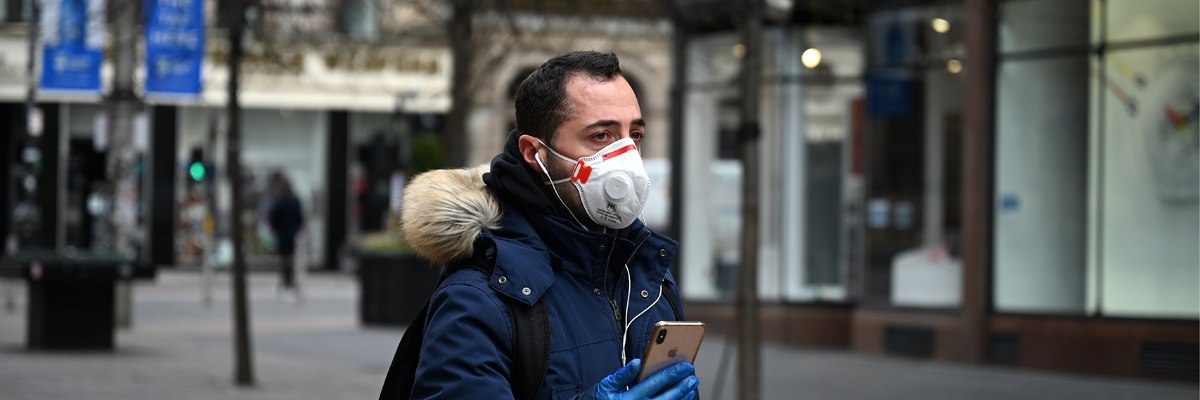National emergencies tend to generate feelings of national unity. And it’s a blessing that they do. Dealing with crises like the one we’re facing at the moment requires resolve and discipline on a national scale so the sense that we’re all in this together, that each of us must do our bit, is vital if we’re all to pull through it. But it’s easy to slip from making the obvious point that the virus is a leveller, no respecter of persons and as likely to attack a duke as a dustman, to supposing falsely that the costs and burdens of the crisis are distributed indiscriminately too. Or to put the point another way: while it’s hugely to be welcomed that we can summon the spirit of national unity at times like this, does doing so mask the underlying and abiding reality, that we are a society still so divided and unequal that, once again, it will be those least able to afford it who will end up paying the biggest price?
Except for the poor man himself, it is perhaps fortuitous that both the prime minister and the Prince of Wales have been diagnosed with having contracted the Covid-19 virus. Few things could better symbolise the idea that the crisis is a unifying one that can affect anyone and, in doing so, help us put aside the differences between us. It’s perhaps on a par with the bombing of Buckingham Palace in September 1940 when Prince Charles’ grandmother, inspecting the damage alongside her husband, King George VI, is said to have remarked “now we can look the East End in the eye”. What she meant was that in the face of the Luftwaffe everyone was equally at risk – crowned heads up the West End as much as dockers down in Wapping -- and that this demonstration of the fact, in the ruins around her, would contribute to the sense of national solidarity necessary to defeat Hitler. To its credit, the Royal Family helped sustain that sense of solidarity by defiantly remaining in London for the duration of the war when it would have been easy to retreat somewhere safer.
Let’s hope a similar mood of national solidarity is kept up long enough to see us through this pandemic and beyond it, when we shall have to pick up the pieces. My question, though, is whether we’re in danger of overlooking the unequal ways we’ll be required to do both.
We could start with Prince Charles himself. It may seem like a cheap shot (and perhaps it is) to point out what could indeed easily be overlooked: that the heir to the throne had, of course, no problem getting himself tested while thousands of others, including vital health-care workers who put their own health at risk by the work they do, simply can’t get the tests for which they should surely have priority.
My point is not to stir up republican antipathy towards the monarchy: you can be sure that even in the most egalitarian republic the president and his clique will always get first bite at the cherry. I simply want to draw attention to what seems to me to be going on under the umbrella labelled ‘We’re all in this together’. Put crudely, it’s that those with less (let’s call them the working class) are paying, and will go on paying, the highest price while those with more (let’s call them the middle class – people like me) have it relatively easier now and will almost certainly go on doing so in the clear-up afterwards.
Take the effects of the lockdown. We’re all exhorted to work from home. If you’re a middle class professional who spends their working life in front of a computer screen, that’s easily arranged. And actually it has its advantages. You no longer have to commute. No one can legitimately expect you to be as productive as you’d be required to be if you were in the office. So you can flexi-work a bit more, start a bit later, maybe, or break off for chats with your partner, themselves home-working under the same restriction and a bit bored out of their mind too. If you end up doing a bit less, does it really matter? And in any case the grass needed cutting.
Compare that oasis of relative leisure with the predicament of the ‘key worker’ who has to go to work: the hospital cleaner, say, or the lad working on a construction site. You do have to commute: you have no choice but to squeeze on to the crowded Tube where any notion of maintaining social distance is for the birds. So you’ve just got to assume that getting the virus is only a matter of time. And when you get to work, everything is stress. A third of your colleagues are off ill; you have to make up for what they would have done; your boss is at the end of their tether and normal courtesy is suspended. Then, exhausted, you have to face the crowded Tube again and now even more people are coughing and sneezing.
And then there’s money. It may be that there isn’t all that much difference between the number of working class people and the number of middle class who suddenly lose their income. But there’s all the difference in the world in the consequences. The middle class worker may well have some savings to tide them over. But even if they haven’t, there’ll probably be some retired member of the family, on a nice pension set up years ago when businesses were more flush with money, who can help out pro temp. The typical member of the working class has no savings and few have relatives who have cash to spare. The government may have acted swiftly to protect most of the incomes of both groups (and now the self-employed as well as those in jobs) but the money isn’t going to come immediately, and in the meantime…
And what about kids? It’s tough for everyone having them at home from school and barred from going out except for a single snatch of exercise. They all miss their mates whether they’re from the posh districts or the poor ones. But there the similarity ends. Do I need to labour the point about the difference between kids who can at least kick a ball round their back garden and those cooped up in an overcrowded flat in a council block? Or between those whose parents can afford to order them some distracting gizmo from Amazon and those who are cutting back on food?
I could go on about all the other ways in which how the crisis here and now is affecting people differently, depending on where they fit in Britain’s class structure. But I don’t need to because you can imagine them anyway. What, though, about how we’ll all fare when the virus has ‘been sent packing’ (to quote the Prime Minister)? Will the cost of the clear-up be equally shared?
It’s hard to see how it can be. In terms of who will keep their jobs and who will lose them it’s perhaps too early to know who’ll come off worst. It’s the effect of what we can already predict that suggests the poorest will once again take the biggest hit. What we know for certain is the government is going to come out of this with the most enormous debt. As a share of national income it could well end up bigger even than it became after the financial crash twelve years ago. The way that was dealt with was a decade of austerity: massive cuts in public spending in order to reduce the amount of money the government had to borrow every year. It worked in the sense that the government did get the annual deficit in its funding and the overall level of debt to come down to manageable proportions. But the ‘hit’ was felt most by those who had least: those dependent on benefits that were either abolished or frozen and those who had relied on public services that no longer existed.
After the crisis we’ll be back to square one (or even further back). If government decides to apply the same remedy – austerity – those people will be hit once again. Of course it’s possible they’ll take a different course, not least because it becomes harder and harder, once you’ve made cuts, to find others. And it may well be that after this crisis, when we’ve experienced the dire consequences of those cuts on the capability of the health and social care sectors to respond, it will be politically impossible to offer yet more austerity. In that case there will be only one choice left: taxes will have to go up.
But don’t imagine that ‘taxing the rich’ will do the biz. Although new forms of wealth tax look a dead cert, no one thinks there will be enough money coming from the affluent to get the government out of the deep, deep red. Everyone will get hit for more tax and given that the poor already have less, it’ll mean that, relatively, they’ll get hit more.
You might say: what’s Humphrys going on about? Has no one told him the poor are always with us? Or that just as the fruits of prosperity don’t get distributed fairly, so neither do the burdens of enforced adversity? Tell us something new.
Well, actually I do know all that. My question is simply this: when national unity is vital, as it is now, is it better we forget all that evidence of what divides us? Or is it even more important at such times that we remember?
What’s your view? Let us know.








